My Time with El Diablo
by Jared Beasley — March 8, 2021
Editor’s Note: We honestly feel like Treeline Journal is not worthy to house this story. We are so honored to welcome out first guest writer Jared Beasley, author of the book In Search of Al Howie. Jared generously tells the tale of his anxiety-ridden early years in NYC and introduces us to a gem in old-school ultrarunning lore when the real eccentrics ruled the game.
I had locked myself in a small space. Gotten too comfortable. Then he moved in. Like something out of National Geographic, he was the stranger your parents warned you about.
You always said the only way you’d leave the “bunker” was if you were carried out.
All the people we knew on the second floor were huddled together. The vet, Duane Reade, and old George. Their bewildered eyes met mine. A walkie talkie squeaked in the crowd. It was trouble.
A sick feeling gripped my gut as I eased between our neighbors. Your door was open – the sound of water trickling as if from a fountain. Drops thumped off the porcelain sink in pits and pats. The familiar odor of sweat and alcohol that normally festered in your bunker was now spreading throughout the entire hallway. It made me angry. These people had no right to that smell. It was your lifeforce; in it were those miles, those thousands of miles at a time; bouncing through the canyons with the Tarahumara, the race across America, the runs in the Amazon and in Papua New Guinea, the temple by the Hudson. They had no right to any of that. They didn’t deserve it. Especially not him.
Michael Stein, the so-called owner of the building was a tiny man. Five-foot tall on bricks, he held his grey slacks up with suspenders, as usual his chest puffed out like a wrestler. The look on his face was a new one, though. It wasn’t the usual condescending sneer he gave all of us when we walked in and out of “his” building. He looked dumbfounded – his mouth so agape, his upper and lower dentures glistened under the fluorescents. I moved around him, too.
The leak came from the room above. It flowed out near the marriage of pipe and ceiling and branched into two streams, spattering drops over half the room. That’s when I saw what you’d done. It was exquisite. The water lapped right over the tiger’s face. You had drawn it in crayon… right on the wall. They wouldn’t understand that. They certainly would never have guessed you were an artist. They didn’t get the tiger either – that it was your way of seeing the world, your sanity. “Eat or be eaten.”
But you’d outdone yourself. It must have been five feet tall by seven feet wide. The style certainly wasn’t realism and not necessarily good. The outline of the beast was a glorified stick figure in red, orange, and yellow – the two fangs formed by perfect triangles. It could have been a ten-year-old’s idea of Picasso. From behind me, the landlord’s voice was wispy and small. “What…what in the hell is that?”
That’s the day they moved you. They didn’t know. No one knew. Even you. That you’d saved me. You made sense of the world, brought it to life, gave it meaning again. I never told you in those nights drinking Russian beer, talking jungle stories, and watching Papillion over and over and over again, that you, my eccentric friend, were my genius.
Daichi Kangyo was a Japanese bank on the 48th floor of the World Trade Center, tower one. I was an office clerk before the planes hit. Fortunately, I’d just left for a job in the theatres and was asleep that morning. I remember walking out onto Broadway and seeing an exodus of people on foot, all heading north. The buses were crammed, an ashy smoke wafting overhead. It was a gamechanger. Everything would be different. Life in the city became filled with threats: Anthrax, car bombs; who knew what was next? For me, it just steepened the slide I was already on. And things got dysfunctional.
Two years earlier, I had stepped off an Amtrak train in New York City, and it was like landing on Mars. Growing up in rural north Alabama, I dreamed of a larger world to explore. Armed with a theatre degree, my 24-year-old-self felt alive; around every corner there was something new. A different nationality, a movie house in the basement of a building, secret Japanese bars above busy ramen shops. But there was a cost.
It is said anxiety is the fear we feel in the face of freedom. I was free, but I was overrun with a new experience: panic attacks. I didn’t even know what they were, but I knew I’d avoid anything and everything that triggered them: tight spaces, wide-open spaces, anything out of my control. I walked everywhere, rain, sleet, or shine, the icy wind ripping through the city canyons somehow always in my face. It’s ridiculous looking back at it, laughable even. But then, it was all too real. For five years I wouldn’t take the subway, a taxi, or even leave the island of Manhattan. Then, HE moved next door.
It was midnight and there was a loud pounding at the door. I opened it and saw what looked like an Aztec – a 5’6, 145lb man with a square face and bulbous eyes, his finger pointing directly between my eyeballs. He reeked of sweat and two-day-old wine, sported a small, misshapen mohawk atop a mostly bald head, and flashed a dull row of gold skulls for teeth. He told me to turn my stupid music down in a thick French accent. I apologized and things cooled. When he showed up the next night with 75-cent Russian malt beers he called “Chernobyl Specials,” we talked all night and for some unknown reason, I opened up to the man with no name.
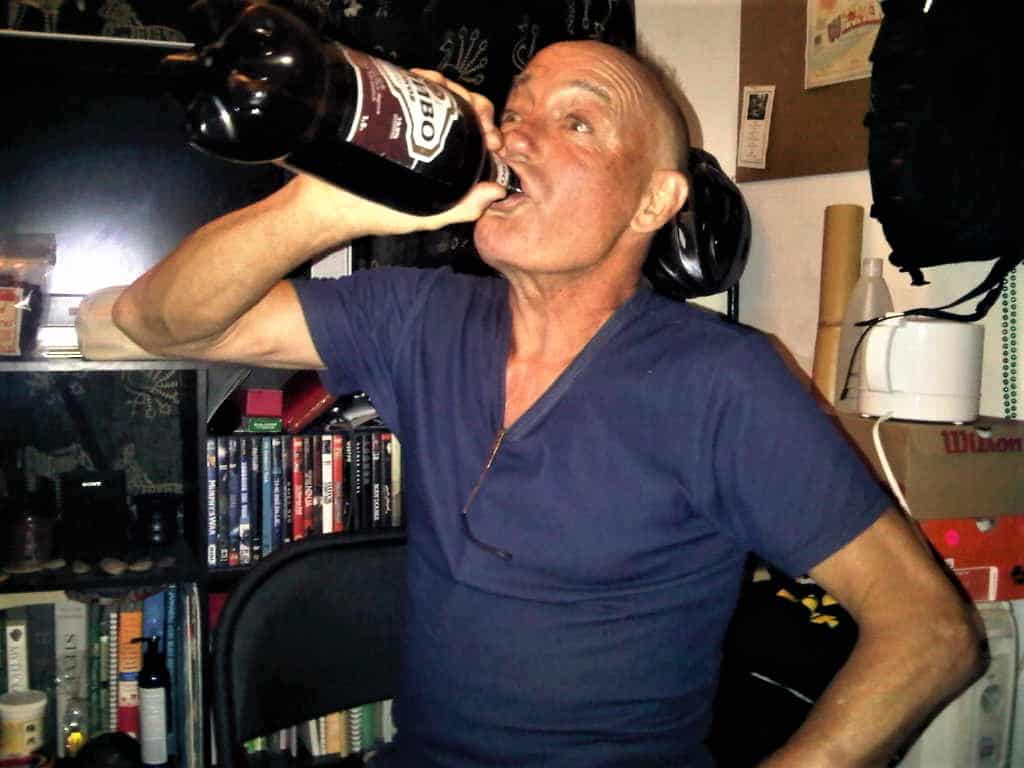
Chernobyl Specials in the bunker.
The Imperial Court was our building, the black sheep of the Upper West Side. In a posh, upscale neighborhood, the 80-square-foot rooms (bunkers we called them) were a sanctuary to those living hand to mouth. An endangered species called affordable housing. Most tenants were eccentrics. Joseph was a gay man at the end of the hall, who always had his door open, spying on us all. He’d lost his partner and restaurant business years ago. He lived off social security, enormous sodas, and Kung Fu Theater. George was from Columbia, always dressed in a suit, and at the age of 80 still had bikini girls pasted to his walls. Yukari was a young Japanese woman who spoke little English, slaved away in dark drinking holes at night and pursued dreams of dance during the day.
Each room had a single window. A shared bathroom in the hallway. Roaches. Mice. Drug addicts. A prickly staff looking for a fight, and enough personalities to fill ten novels. I must have fit right in. I remember the agent at Moss Reality and his kind expression when I told him I didn’t have the upfront deposit. “Hey. Don’t worry,” he said. “We cater to people like you.” They must have felt the same about my new neighbor.
I assumed he was an alcoholic, jobless hothead. While I was right about most of that, there was a hell of a lot more to him. I didn’t know his real name but was certain it wasn’t “Crocodile Dundee” like he said it was. So, I called him “the Pirate.” It would have been easy to dismiss him, avoid him. But my friends have always been crazy. If you put up with 45 minutes of nuts you might get 15 minutes of brilliance.
He was in his late 50s but in impeccable physical shape. He’d done 24-hour bicycle races in Central Park, run numerous six and seven-day footraces in Queens, placed third in the first organized 1,000-mile run in the world, finished fifth in the revival of the 3,000-mile Trans-America footrace in 1992 and won a 1,000-mile race across Texas, where the conditions were so bad everyone else dropped. He was everything I wasn’t. Fearless and primitive. No cell. No computer. No TV. No bank account. And somehow just what I needed.
He showed up the next day at noon like he said he would, a small rucksack strapped to his back. I followed him into Riverside Park, swallowing my anxiety. There, through the trees I saw where we were headed: a 200-meter cinder track on the banks of the Hudson. “This is it,” he said. “This is all you need.”
I was done before we hit a mile. It’s amazing how fit those who are unfit believe they are. He ran for hours. I sat on a bench by the greenway and watched the waves slap the rocks, the faces of joggers, bikers, old couples eating ice cream. I wondered why so many people looked so happy. Were they faking it? Why was I so serious?
He finally came down, sat beside me, opened up a large bottle of apple juice filled with booze and said, “same time tomorrow.” He was adamant the answer to all my problems was simple: to run.
There was no doubt I was dying or was already dead. The first attack happened just before moving to the city. The adrenaline pumped so fast, cycled through every part of me at such intensity that I felt outside my body. Crouching in the back of my car, it took 30 minutes to get out and into my place. I went to the student health center the next day, but not knowing what had just happened, I described something more like vertigo.
I wouldn’t know what they were till I got to the city. By then a cycle had started: wherever an attack happened, I avoided that situation. Then the world got small. I saw a social worker once a week, and we delved into my psyche. We concluded that the idea of “moving forward” was the culprit. The insight was powerful and made sense but didn’t help me day to day. In fact, it seemed to make things worse.
I had come to be an actor, but my issues kept me from getting work. Joe Allen was the spot to be after the theatre. The aged wood of the bar was like honey for any bee who loves serious drink. Every night, it was crammed with working actors, famous and not so much, and those that wanted to be. I had my nook in the corner. After padding myself with four or five Jack and Cokes, I’d talk to anyone and everyone. Some big names. Dom Deloise, Roscoe Lee Brown, Al Pacino, Jennifer Ehle (loved her), Geoffrey Rush (not so much). Actors are opportunists. Everyone is hoping for some connection. But honestly, nothing comes from any of that other than the memories.
Most nights, I sat there by myself, tanked, looking at the signed picture of an F1 car and the two nudes on the wall. It was said the blonde-haired, apple-bottomed girl was once the owner. She had stipulated that they were to remain on full display, forever, as part of the sale.
New York was still a wild space then. Parts were untamed. Hidden in basements and lofts, you could find an oasis for yourself; you could hideaway. And I did. Walking the streets at night, buildings felt alive. Without the crowds, they were your friends.
The first two weeks of running with the Pirate was hell. Sitting in my bunker, wasted, he would drop by with a little bark at the door and give me a newspaper clipping or lend me a book. The first was Never Surrender. It was the story of a Japanese soldier who’d lived in the jungles of the Philippines for 30 years convinced WWII was still on. The next was Papillion, the story of a man hellbent on escaping Devil’s Island. After each attempt, he was thrown back into solitary, where he paced his 10 x 10 cell until he could try again. We related; our bunkers were 9 x 9, and life was a jungle to my new friend. The gold ring on his right middle finger embodied that. It was a series of gold skulls wrapped in gold snakes. “This is what it’s all about,” he’d say, pointing to it. “All the rest is Mickey Mouse.” That’s when I first got an inkling that he was about more than just running. But I still didn’t trust him.
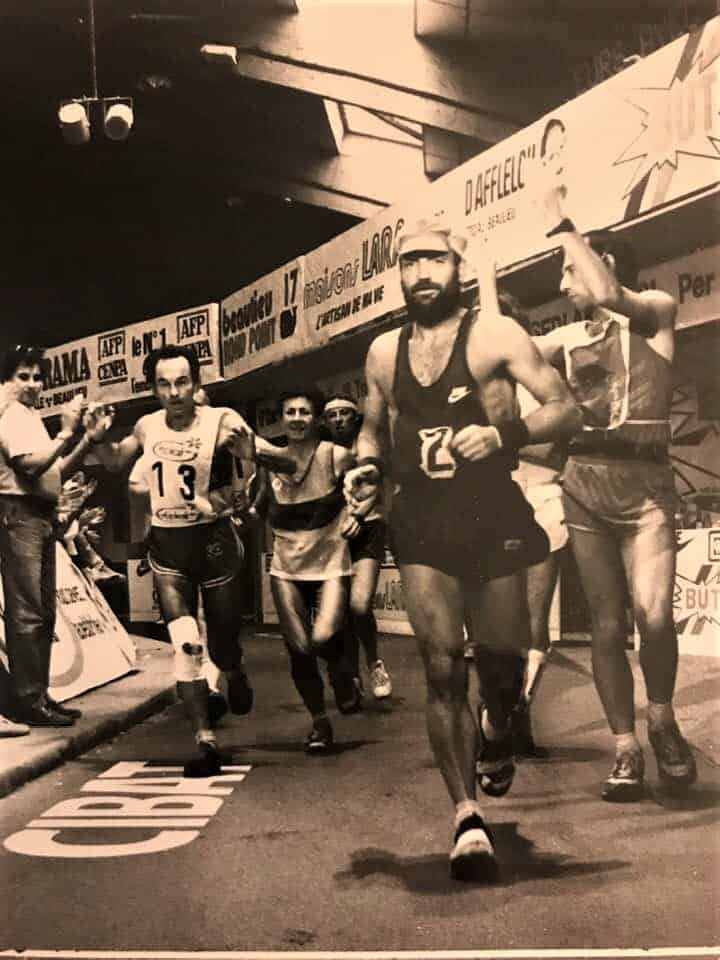
The Pirate at La Rochelle Six-Day Race. 📸: courtesy of Trishul Cherns
There were many reasons to be suspicious of this guy. He exuded danger. Even dogs sensed it. More than once I’ve seen him get bit. Big dogs, little dogs. Once in Las Vegas, he was mauled by a Rottweiler. Maybe they sensed he would just as soon eat them as pet them.
He never wore anything that wasn’t hand-cut running clothes. He chopped off sleeves and collars, cut the legs off sweatpants and always said the wrong thing in public as if on purpose. Many times, we weren’t allowed into bars or restaurants because they didn’t like the look of him, or he asked them if they served flesh.
He had a hardcore alcohol problem. Never drank anything that didn’t contain booze. He also ate my food. On top of that, his stories were too much for anyone to believe: living with the native peoples of Papua New Guinea and tribes in the Amazon, blowguns, shrunken heads, and wives speared down in combat. Back home in Alabama I knew too many people that claimed to have thrown 80-yard passes on the football field and made ten full-court basketball shots in a row. He could see I didn’t believe him. So, one night he brought down what he called his “portfolio.”
As long as I live, I’ll never forget that night. First, he had me play “Je ne regrette rien,” by Edith Piaf and keep it on repeat. He bent over and real tears streamed down his cheeks as he pulled out two collages of pictures, laminated and folded, from his rucksack. He handed it to me with a grunt like a boar, pulled it back away from me, then handed it to me again. There he was by god, half-naked amongst wild natives in ceremonial gear, eating a bat out west; beside that were the pictures of the bones of the “wife” tucked into a pot they’d kept out in a sun-hut to “ripen.” (Primitive tribes will often grant wives to newcomers if they are accepted as to keep wandering eyes off their women). But perhaps the most unbelievable feat was crossing the Darien Jungle.
Located between Panama and Columbia, it separates the North and South American Continents. And it is one of the wildest pieces of terrain in the world. If the Fer-de-Lance viper doesn’t get you, there are jaguars, vampire bats, and armed militias hiding out among the swamps, mountains and rainforests. Outside Magazine called it “the World’s Most Dangerous Jungle.” The Pirate went in with two young men on motorbikes. When they quit after a single day getting stuck in the muck, he went it solo, on foot, with a rucksack, a machete, and a hammock. After countless weeks, he made it out, starving and crippled with rabies. When the military guards saw the zombie-like figure, they immediately quarantined him for 40 days at an outpost. He escaped, only to be caught again in Ecuador and quarantined once more in the capitol of Quito.
He was on his way to Patagonia, hitchhiking and backpacking all the way from New York City. The trip would take him two years. It was one of three years-long adventures that took him to the Yukon to Thailand and Papua. In a pre-9/11 time, he slept under the stars at Machu Picchu, atop Chichen Itza, and out in the frigid open air of Dawson City.
Seeing him on the streets of New York, double-timing it through piles of snow and dodging tourists, you couldn’t help but feel he was some sort of mystic. We ran every day. Sometimes twice a day, always at the 200-meter cinder track he called “the temple.” He became a mad guru to me. But not everyone felt that way.

The Temple.
Suddenly, we weren’t the ideal tenants anymore; we were obstacles to profit. When new owners came in, bunker life changed at the Imperial Court. Open rooms were no longer rented as apartments but as illegal hotel rooms. Tenants were harassed and kicked out left and right. It was a growing trend in the city. Cameras were installed to watch us, and private investigators paid to follow us. One small slip up and you were out. Had a boyfriend or girlfriend staying with you for more than a week? Out. Staying with a boyfriend or girlfriend for more than a week? Out. Behind on rent? Out.
Life in the bunker became warfare. You stayed on guard. And no one knew how to lay low and fight a corrupt system better than the Pirate. Till the leak. Till the painting: the massive, crayoned tiger.
It was at this very time that my father passed. There were no warning signs. But you’re never prepared anyway. I was destroyed, and all I could do was run. For three days I stayed in Riverside park, running and running. I came back only to use the bathroom and shower. At night, I sat atop a giant rock looking out at the horizon toward Alabama and imagined I was talking to him. The Pirate was the only one there with me. He listened.
The temple was home base. Nestled between 73rd and 75th street, it was a miniature amphitheater, its stone steps curved lengthwise in a half bowl and rose up like bleachers. Abandoned and cracked, they watched over the track and guarded the Hudson as it slipped between New York and Jersey. Across the river, lights blazed along the banks like a string of torches. Sitting there, you’d never believe you were in Manhattan. When I was with him, I wasn’t.
The temple was a gym with no fees. There was no opening time or closing time. You didn’t need a membership and there were no TV monitors. No signing up. No credit card needed and absolutely no contracts. It was there, open, and free, 365 days a year.
There, I learned about the other muscle, the one the Pirate was obsessed with: toughness. He ran in the day when it was the hottest. Summer. Two o’clock. He ran when it was the coldest. Winter. Midnight. When it poured outside, he went for a run. When hurricanes came, he was at the track. When the cinder was covered in snow, he still did his laps. He didn’t want things to be easy. He wanted the runs to be the hardest part of his day. When excuses are not an option, you won’t find any. “The hardest part is putting on the shoes,” he says.
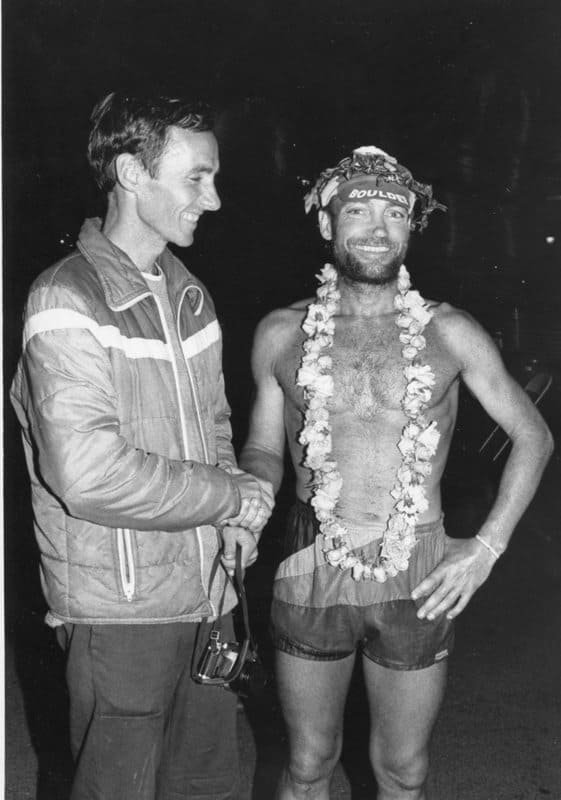
The Pirate after finishing his first 1,000 miler.
Running wasn’t a magic bullet. I didn’t suddenly start bungee jumping from the George Washington Bridge. But it put a floor beneath me. I didn’t get any worse. I learned to narrow my vision, follow the steps ahead as I ran, squint my eyes and shut out all the noise, listen to my breath, feel ME. The panic became more manageable. Then, one day, it would become a distant memory.
The Pirate survived the painting fiasco; they actually moved him to a bigger bunker! He was lucky. Or maybe they were afraid of him. But it was on another floor. That’s a big difference in bunker world. Things would be different, but they always are. After 11 years with the Pirate, I finally learned his real name and found more running career than I could have imagined. He’s secretive about it. There’s a bitterness there only he knows. A rare, chronic form of Malaria crippled his chances of winning. Runners that know him, know. Others will do a little research and find him. But I’d suggest his name is not so important. In shadows our imaginations find energy and life. It’s that space he prefers to inhabit.
Change is hard. For everyone. Sometimes it’s quick. Other times it’s so slow you think nothing’s happening.
One day the investigators came looking for me. I’d been spending too many nights with my soon-to-be wife. I’d leave the bunker. But it would never leave me. Ultimately, I did 17 glorious years at the Imperial Court. As rough as it was, it’s my favorite time to remember. There I connected the dots between acting and writing and found a new career, a new life. Still, I try to remember the outstretched hand that wants food might be the one that pulls you out of the gutter.
It was our last run together. The sun hung low over the Palisades, casting the Hudson a brilliant copper. The temple was empty, strewn with long shadows from the crab apples and oaks. I found you there, shirtless and horizontal, balancing your entire body on a wrought iron fence across your abdomen, your arms outstretched like a skydiver. It was a thing of beauty, a moment in time.
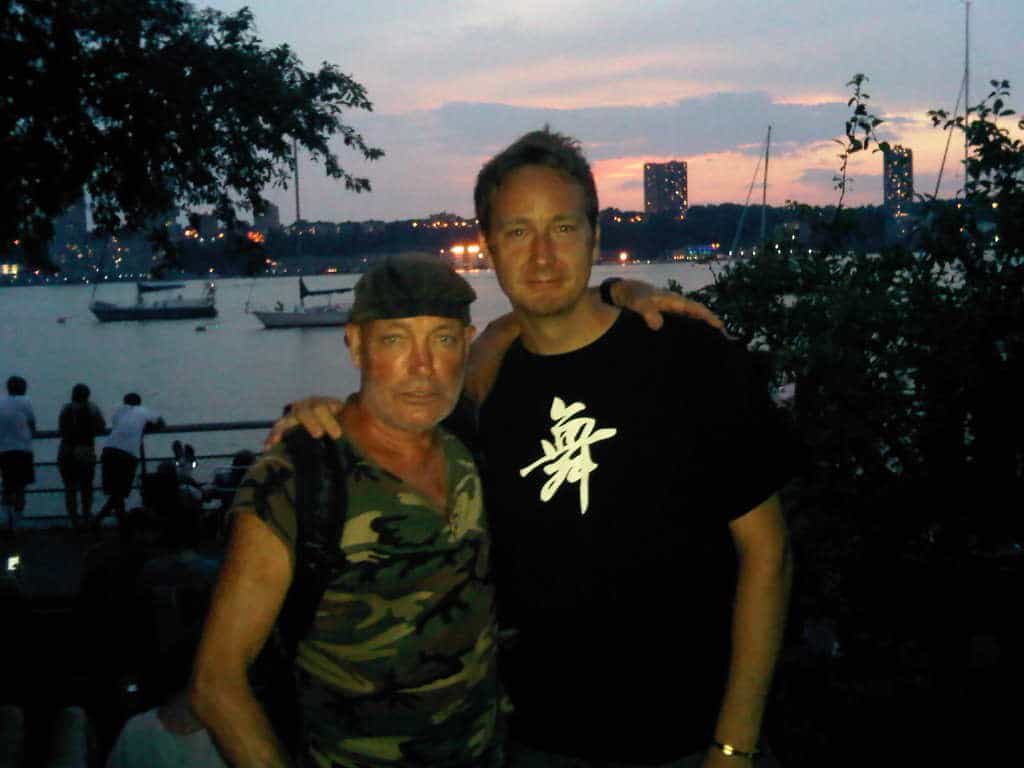
Me and the Pirate.
Whatever it was that made you grab your rucksack and take off in a mad sprint, I’m not certain. But I followed. Weaving in and out of bike paths at a gut-sucking pace, it took all my stamina to hang with you. I thought you might be trying to drop me, to escape. But where you were going, I wanted to be.
You were nothing more than a blob of flesh through the sweat in my eyes, as twilight danced on the water. I heard a man yell out, “Hey, that’s the man who ran across America. That’s El Diablo.” You didn’t acknowledge him. In seconds we were up a slope and back into the middle of the wooded park.
I was bonked when we hit the stone steps at 119th. You disappeared over the top, and I trudged up to Riverside Drive like a climber on Everest’s third step. I saw a glimmer in the shrinking light. It was you on your knees by the iron fence near the woods.
“Minuit,” I heard you call out in a faint whisper. “Minuit,” you called again louder. “Ca va Bien?” It was then I saw the eyes, the glowing green orbs in the dark of the trees. The midnight-black cat approached cautiously. Feral, scarred and rough, it moved like a jaguar, powerful, graceful, confident.
I thought of David Attenborough and his warning that less than 35% of our wild spaces remain on Earth. And with that, the wild ones have nowhere to roam. So, they go underground. They live in the new wilderness: our cities, our slums, our park benches, our SRO’s like the Imperial Court.
You slowly reached into your rucksack and took out a small container of Half and Half. As my eyes adjusted to the dark, I saw a small saucer and a plate in the brush. You poured the milk in carefully, as a mother would care for a child. But the cat didn’t move. Not until you backed away. “He doesn’t let anyone touch him,” you said proudly as he drank. “He just needs to fill the bag.”
A couple once tried to capture Minuit and bring him into their home. It didn’t work; he tore their place up fierce. “He doesn’t belong in some Mickey Mouse apartment.” Your voice was dripping with venom. “This is what he needs – to be free.”
Beside the gate was a sign that read “protected trail,” and below that “forever wild.” As Minuit licked up the milk, you drained a bottle of your “apple juice.” I couldn’t help but feel you were both on the edge of extinction.
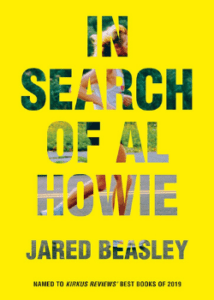
Jared Beasley is the author of In Search of Al Howie, chosen to Kirkus Reviews’ Best of 2019. He has written for Runner’s World, Like the Wind, and Ultrarunning magazines.
Click here to learn more about In Search of Al Howie and author Jared Beasley.
If you enjoyed this article, consider supporting Treeline Journal by becoming a patron for as little as $2 a month! More patrons, more incredible articles like the one above! Thank you!


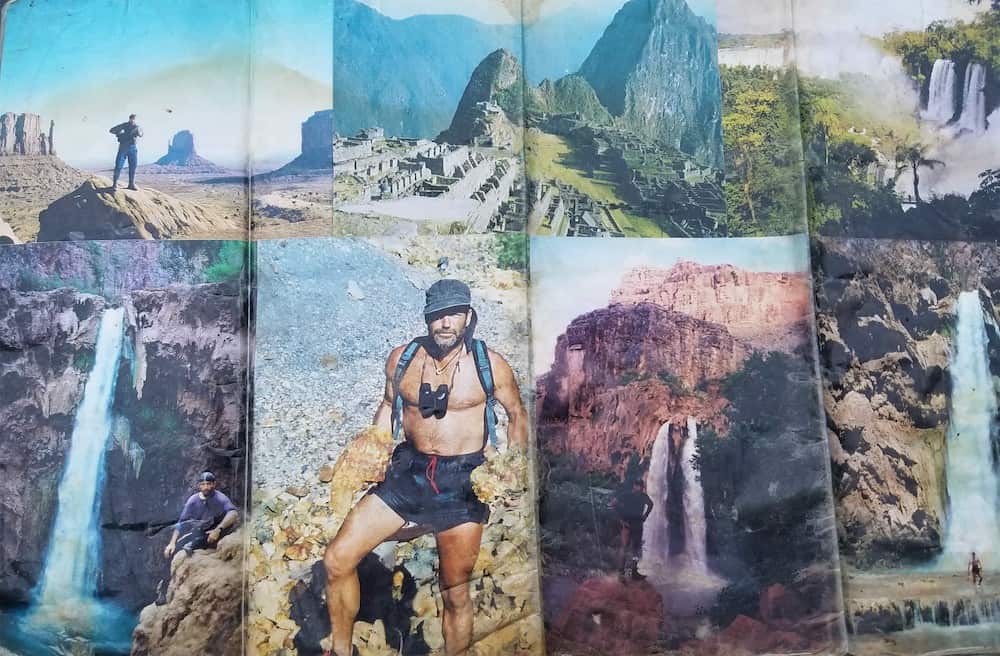
I know this cat Jared, also a bad m——rf—-er, only with a writing utensil in his hand. Running is the hardest sport to write about, except when he does it! As anyone can see.
The piece itself, I shed many tears: for Emile (who considers me an enemy); for the wildcat known as Midnight; for the Wilderness itself.
It’s a painful truth that humans are vulnerable, and we need to embrace the animals, our own instinct to run, and the Earth that we can’t control.